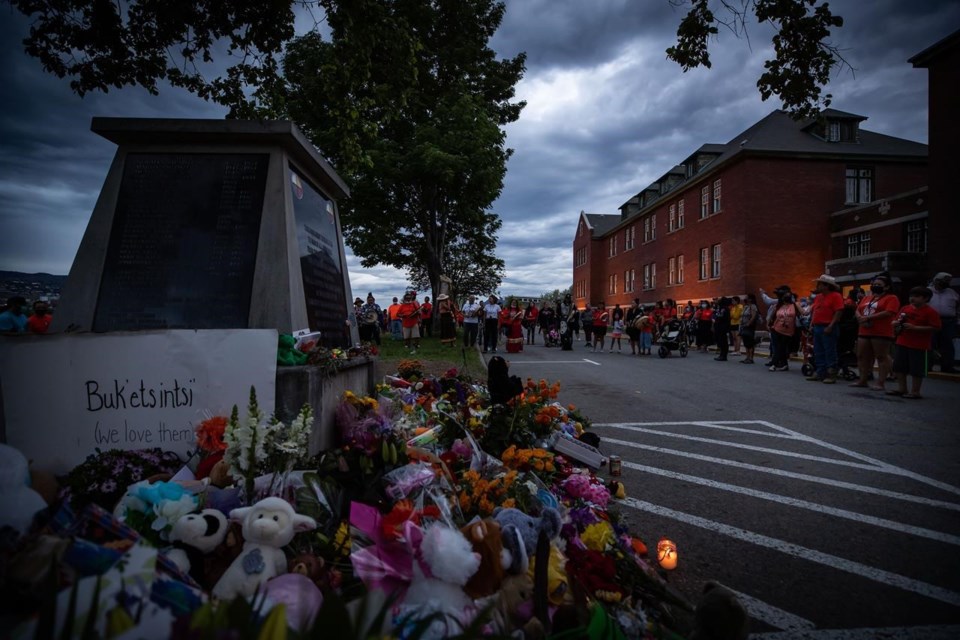VANCOUVER — Colette Trudeau learned the truth about her family's heritage at age eight, and that's when she began to understand that pretending to be French-Canadian was a way for her great-grandparents to keep their children from being taken away to residential school.
The revelation came from an Aboriginal education support worker at Trudeau's elementary school in Maple Ridge, B.C., with a suggestion that the little girl go home and speak with her father, who sent her to her grandmother, who resisted the request for answers.
Hilda Trudeau, who died five years ago at age 83, finally relented as the family worked to reclaim its Métis heritage, which Colette Trudeau, now 36, has passed on to her own daughter as she works with a group that is supporting those who did end up suffering abuse at residential schools.
On Monday, the B.C. government announced that Métis Nation BC is one of three Indigenous groups to receive part of $1.5 million in funding to provide for the mental health needs of residential school survivors and their families.
Murray Rankin, the minister of Indigenous relations and reconciliation, said the money is part of $12 million in funding the province announced in June after the discovery of what are believed to be the remains of more than 200 children at the site of the former residential school in Kamloops.
"We've heard from Indigenous service providers that they have seen a dramatic increase in demand for mental health and wellness support," he said.
"This is a time of reckoning in British Columbia and across Canada. We must ensure as a government, as a society and as individual British Columbians, that we stand with Indigenous people and recognize the truth of our colonial system."
Groups receiving funding include the Indian Residential School Survivors Society, which will use it to enhance a round-the-clock support line, as well as the Tsow-Tun Le Lum Society, so it can provide more in-person health and wellness.
Métis Nation BC, where Trudeau is senior director of operations, will use $250,000 in funding for needs that are specific to Métis survivors and their families, who will get 10 free counselling sessions.
Trudeau said they will also be able to gather at a forum to focus on how their needs can be met as a population that has historically not been well understood as residential school survivors, along with First Nations and Inuit.
There's not a large awareness of Métis people in British Columbia, including that they went to residential schools and were part of the Sixties Scoop, she said in an interview.
As for learning the truth about why her family was forced to go "underground" as French-Canadians, Trudeau said she was able to tell her grandmother that her parents made a difficult decision to keep their family together but lost their language and culture before they were finally able to take pride in their Métis heritage.
Mental Health and Addictions Minister Sheila Malcolmson said the findings at the residential school in B.C. have been heartbreaking for so many dealing with past atrocities.
"It's a sharp reminder of the work we have to do, of the pain that takes many generations to heal. And a lot of hurt that is out there that we see every day in our country and in our communities. It's important that we talk about it."
Angela White, executive director of the Indian Residential School Survivors Society, which has received $750,000 in funding, said the organization has tried to ensure there is cultural safety for anyone who is asking for support to deal with the trauma they suffered and also offers a round-the-clock crisis line.
"It's about having someone on the end of line who's Indigenous, who understands the lived experience, has cultural competency associated with having these types of conversations, and that empathy that comes with these conversations," White said.
Rankin said there are 21 so-called caretaker communities near various residential schools and each of them has received up to $475,000 in funding.
This report by The Canadian Press was first published Sept. 27, 2021.
Camille Bains, The Canadian Press



